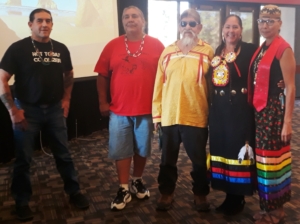Indigenous Peoples Day to be celebrated over two days at SOU
(Ashland, Ore.) — Southern Oregon University’s annual Indigenous Peoples Day celebration will return to campus for a weekend full of activities on Oct. 19 and 20, from Native dancers to guest speakers to lunches of salmon on Saturday and Indian tacos on Sunday.
Indigenous Peoples Day celebrates the historic, cultural and present-day influence of Native Americans. The theme of this year’s celebration is “Honor the past, empower the present, inspire the future.”
SOU has formally observed Indigenous Peoples Day since 2017, after a student and the university’s Diversity and Inclusion Oversight Committee petitioned for the change a year earlier. The state of Oregon began recognizing the holiday in 2021.
This year’s celebration – the seventh at SOU – will begin at 10:30 a.m. on Saturday, Oct. 19, with a “grand entry” procession of Native American dancers at the university’s Stevenson Union. A period of “welcoming” will begin at 11 a.m., followed by a $10 salmon bake lunch (cash only) at noon. Guest speakers and open sharing of songs, dances and stories will be from 1 to 4 p.m.
The celebration will continue on Sunday, Oct. 20, with guest speakers and open sharing throughout the day, from 10:30 a.m. to 4 p.m., and Indian tacos and frybread offered by SOU’s Native American Student Union (cash only).
An Indigenous artisans market and a variety of other activities will be held during both days of the celebration.
Dancers are invited to join Saturday’s grand entry procession, and Native American regalia is encouraged. More information about the celebration is available from Kenwani Kravitz, SOU’s Native Nations Liaison, at kravitzk@sou.edu or (541) 552-6937.
Hosts of SOU’s Indigenous Peoples Day celebration include the university, its Office of Equity, Diversity & Inclusion, the Native Raiders office and the Native American Student Union.
-SOU-



 SOU alumna Lupe Sims – a descendant of the White Mountain Apache Tribe, and adoptive daughter of Mark and Felcia McNair of The Klamath Tribes – partnered with the university’s Diversity and Inclusion Oversight Committee in 2016 to petition for recognition of Indigenous sovereignty. Formal observation by the university was declared in June 2017, and the Ashland City Council voted two months later to follow suit.
SOU alumna Lupe Sims – a descendant of the White Mountain Apache Tribe, and adoptive daughter of Mark and Felcia McNair of The Klamath Tribes – partnered with the university’s Diversity and Inclusion Oversight Committee in 2016 to petition for recognition of Indigenous sovereignty. Formal observation by the university was declared in June 2017, and the Ashland City Council voted two months later to follow suit.



